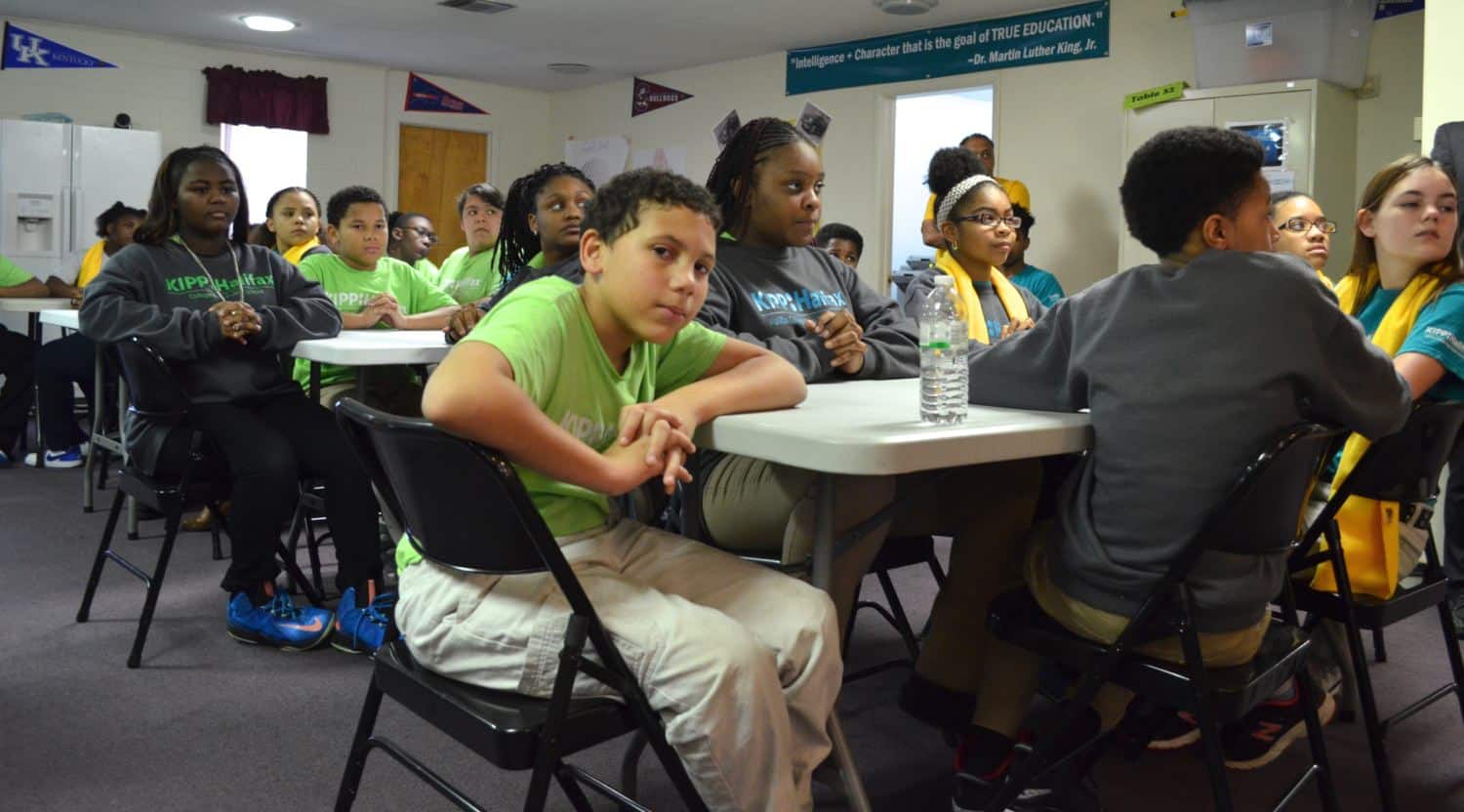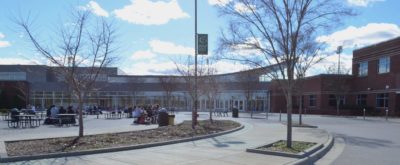The battle lines seem firmly drawn when it comes to opportunity scholarships, also known as vouchers. It is expected that Democrats are opponents and Republicans are proponents. But these are generalizations, and generalizations don’t always apply.
Last week was National School Choice Week. According to the website, “The goal of National School Choice Week (NSCW) is to raise public awareness of all types of education options for children. These options include traditional public schools, public charter schools, magnet schools, online learning, private schools, and homeschooling.”
EdNC had a host of content on the topic of choice, including a profile of a charter school; a profile of a private school that accepts opportunity scholarships; an interview with a former Charlotte Mayor and school choice advocate; a perspective from Lee Teague, executive director of the Association for Public Charter Schools; and a perspective from Keith Poston, executive director of the Public School Forum of North Carolina.
During the week, I had the opportunity to travel with Darrell Allison, president of Parents for Educational Freedom in North Carolina (PEFNC), and his vice president of communications & outreach, Brian Jodice. We covered about 286 miles as the pair carried the message of school choice around the state.
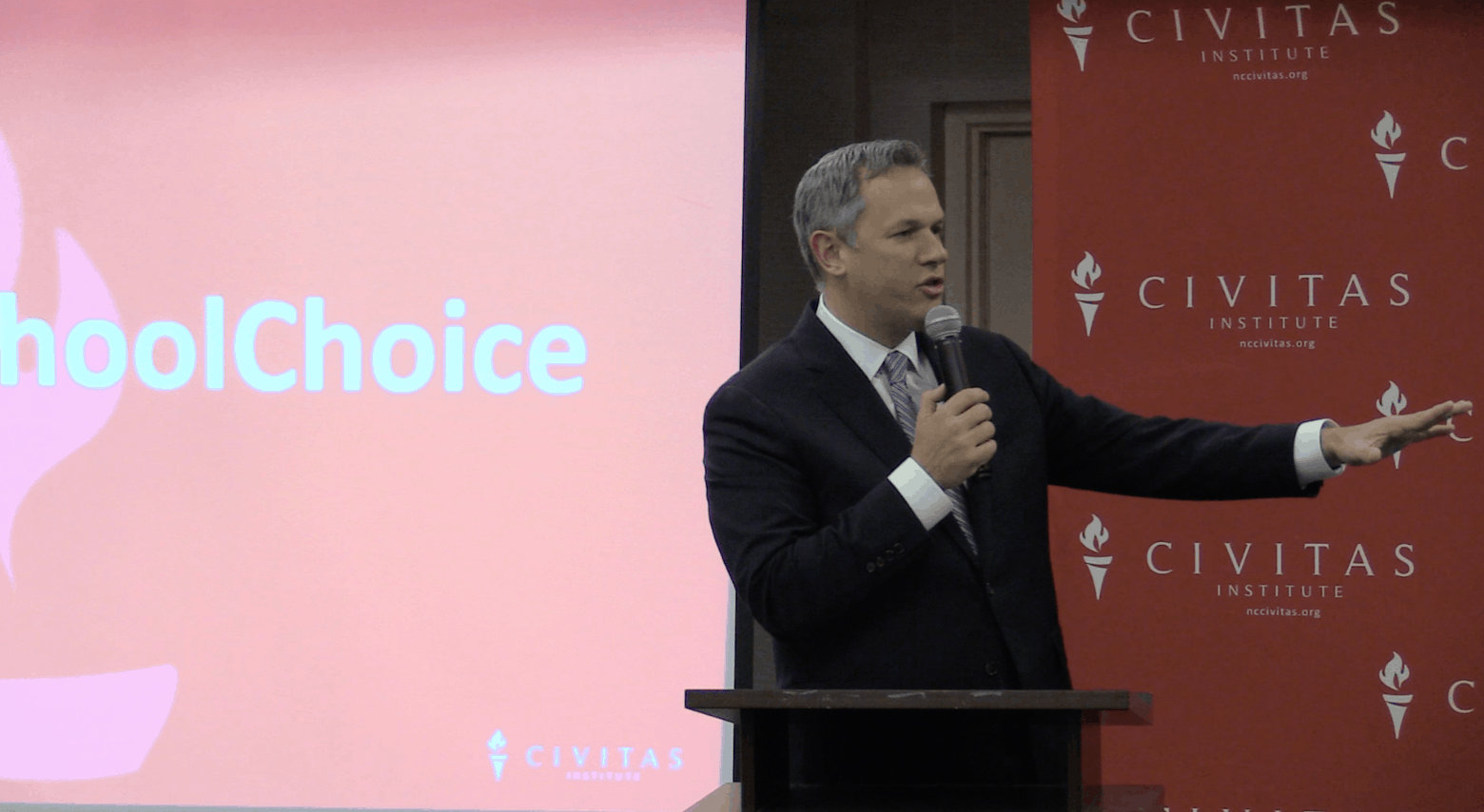

Our first stop was the Holiday Inn in downtown Raleigh — formerly the Clarion Hotel, which we locals describe as the giant hair curler. There, the Civitas Institute was holding an event to release the organization’s latest poll on school choice.
The proceedings began with short introductions by Civitas President Francis De Luca, followed by Allison, a parent who homeschools her son, and then Lieutenant Governor Dan Forest.
Forest homeschools his children, and he said at the event that being for choice doesn’t make one anti-traditional public school.
“A lot of people will think if you are part of the school choice movement, then somehow you may be against traditional public school in some way, and that’s not the case as all,” he said. “The case is saying there are options out there for parents, and parents need to have the option for an excellent education for their child, for their student.”
In fact, he said that traditional public schools are part of school choice.
“We have great traditional public schools out there. We have some great ones out there doing great work. We have some great charter schools. We have a lot of homeschool students. We have some great private schools,” he said. “It’s a good mix, but parents have the opportunity to make that selection for themselves.”
See the video of all the intros, including Forest’s towards the end.
Later in the event, Bob Luebke, senior policy analyst at Civitas, did a presentation on the latest Civitas poll on school choice.
The poll numbers included highlights, such as these:
- “Seventy percent of North Carolina likely voters polled believe that ‘state lawmakers need to do more to expand educational options for families.'”
- “If resources were not an issue and you could select the best school for your child, what type of school would you select for your child?”
44 percent: Traditional Public School
35 percent: Private School
11 percent: Charter School
8 percent: Home School
2 percent: Virtual School
- And 53 percent of respondees said that parents should be able to choose where their children go to school.
Luebke broke down the numbers on that question, showing that of the poll respondents, 87 percent of Republicans agreed, 78 percent of Democrats agreed, and 76 percent of unaffiliated voters agreed. When it comes to demographics, 70 percent of white respondents agreed, 84 percent of black respondents agreed, and 78 percent of Asian respondents agreed. Eighty five percent of parents agreed and 76 percent of non parents agreed.
The poll was conducted of 811 registered voters between the ages of 25 and 54. Seven hundred and fifty of them were identified as 2016 voters. Four hundred and eleven were parents. Forty-four percent voted for President Donald Trump and 41 percent voted for Hillary Clinton.
To see the presentation and more of the poll responses, including breakdowns by party affiliation and demographics, watch the video below. Peruse the poll results here.
Finally, Civitas held a panel discussion on school choice, moderated by Allison. See that video below.
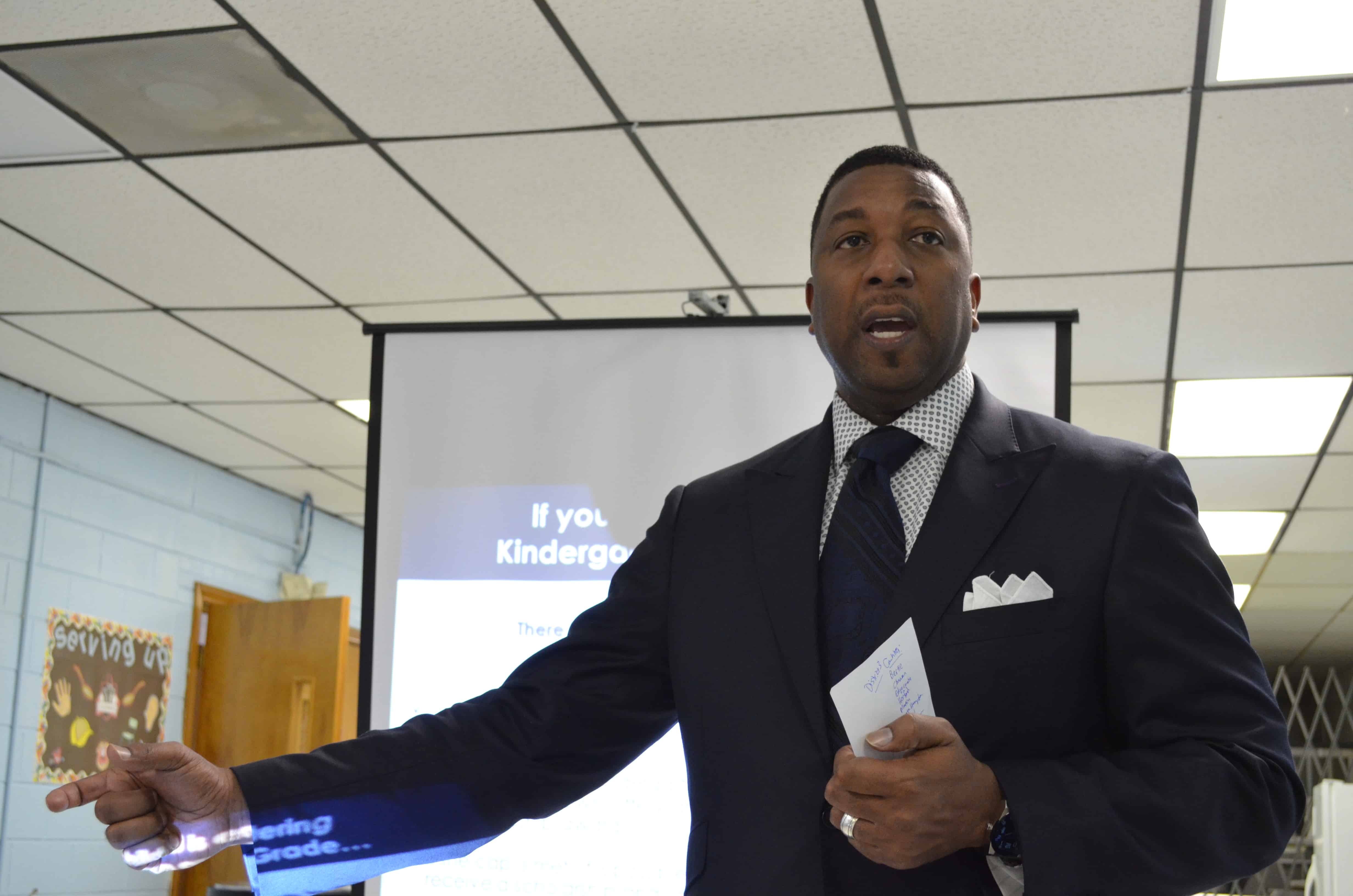

Darrell Allison will be the first to say that he’s not an educator. Before founding PEFNC in 2005, he had worked on Capitol Hill and at the Civil Rights Division of the Department of Justice. He is a graduate of North Carolina Central University and the University of North Carolina School of Law.
He said he started PEFNC after hearing about high dropout rates in North Carolina, including the fact that the majority of African-American males weren’t graduating. He knew the question of choice, and opportunity scholarships in particular, was a partisan issue championed largely by Republicans. Starting the organization in a state where both the Governor’s mansion and both chambers of the General Assembly were helmed by Democrats, he had his work cut out for him.
“I had a Republican back in 2005 saying, ‘Darrell I commend you son. I’m with you on the issue, but it isn’t going to happen,’” Allison said.
But Allison thought that, regardless of party affiliation, he could change people’s minds.
“I have to believe that leaders, regardless of whether they’re Republican or Democrat, have to move in a space to try to remedy and to make things better,” he said.
For the first 3 1/2 or so years of PEFNC’s existence, Allison traveled around the state in a beat-up Honda Accord. He met with parents and community leaders, sharing education statistics with them that they didn’t know about. It was a public information campaign which he hoped would set up support for what would come later.
In 2008, Allison said that PEFNC held a gathering of constituents in Southeast Raleigh. The group invited 15 elected officials, almost evenly divided between Republicans and Democrats. PEFNC expected about 300 people to attend. About 1,200 showed up, he said.
“Both Republicans and Democrats were just looking around with their mouths open, in shock,” Allison said.
That was when Allison really began to move the needle on the issue of school choice. And it wasn’t only Republicans he was reaching out to. He notes that many Democrats voted to approve a 2011 bill that created tax credits for children with disabilities, the precursor to the special education opportunity scholarships that now exist and which give public money to children with disabilities to attend private school.
But, of course, it was when the Republicans swept the General Assembly in 2010 that choice really started to take off.
The cap on charter schools, which kept the number at 100, was lifted in 2011, and two years later the special education scholarship program was passed, also with support from some Democrats.
The General Assembly also passed the regular opportunity scholarship program in 2013. That program offers up to $4,200 to students who want to attend private school in North Carolina. There are limitations on who is eligible, which we will cover later in this article.
In the 2016 short session of the General Assembly, that program was ramped up. The budget for the program is supposed to go up by $10 million each year for 11 years, increasing funding from about $35 million appropriated in 2016-17, to almost $145 million in 2027-28 and each year after.
Still, despite the success of school choice options under Republican control of the General Assembly, Allison said he was careful when starting PEFNC to not just cater to conservative whims.
“Our organization probably could have been bigger faster. We could probably have been more prominent out there on this issue early on if we had embraced a lot of ultra-conservative influential leaders out the gate,” he said. He added that the organization was thinking long term and knows that, in the end, North Carolina is purple, not red.
The Civitas event we covered earlier is a good example of Allison’s attitude. PEFNC partnered with Civitas for the gathering, but Allison explained to me that his organization doesn’t agree with Civitas on everything it believes, including on some issues of school reform. However, he said he liked the diversity of people who attended.
There were some normal school-choice proponents, like Rep. Larry Pittman, R-Cabarrus, and former Rep. Paul Stam, R-Wake, but there were also people like Rep. Ed Hanes, D-Forsyth, and Bruce Mildwurf, associate director of governmental relations at the North Carolina School Boards Association.
That’s not to say that everyone in the room was in agreement on school choice, but that’s not a problem for Allison. He encourages discussion among opponents.
“Not everything that comes our way should be quickly dismissed,” he said.
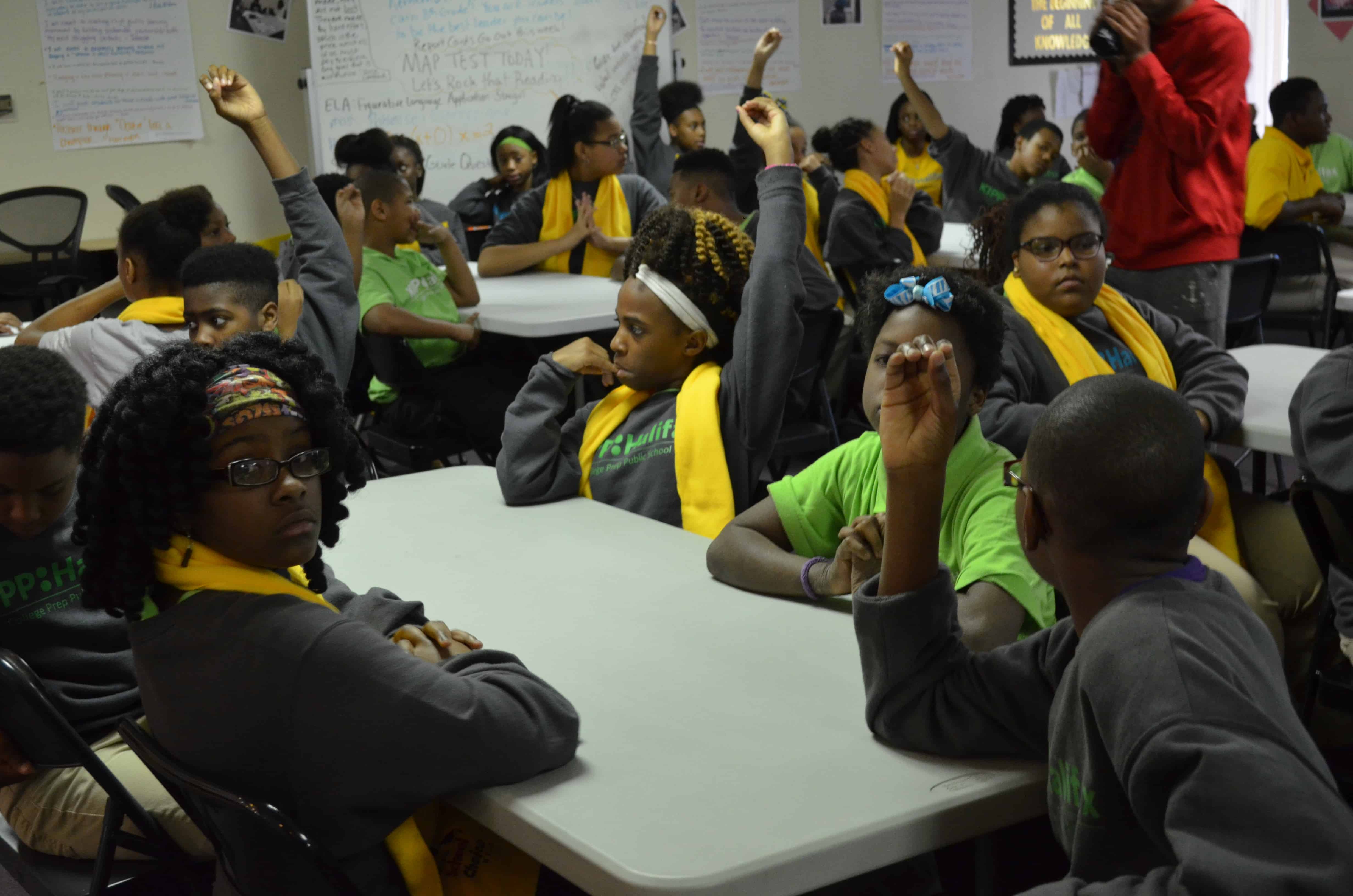

Our next stop after the Civitas event was KIPP Halifax in Roanoke Rapids. The school is in its third year and, even with a letter grade of D in the 2015-16 School Performance Grades, is a higher achieving middle grade school than any of the middle schools in Halifax County Public Schools. It serves grades 5 through 8.
There are two middle schools in Halifax. One got an F on the school performance grades. The other got a D, but performed slightly lower than KIPP Halifax in some areas.
KIPP Halifax is part of PEFNC’s Charter School Accelerator Program. The program focuses on schools in low-income and, often, rural areas of North Carolina.
When the cap on charter schools was first lifted, Allison said the flood of applications was seen mostly in metropolitan areas. He didn’t want to see the parts of the state that get less attention languish.
“I said, you know, we can just talk about public charter schools, but maybe we can help create an opportunity here for public charter schools with a mission,” he said.
He created the accelerator program, which has a group of about six people led by Tom Miller, who formerly worked in the state’s Office of Charter Schools. The accelerator program offers schools support, training sessions, and other instruction to help staff cater to the needs of their unique populations.
Even with 167 charter schools in the state currently, there are still some counties with none at all. It is counties like those where PEFNC hopes to make some of the most impact.
“It didn’t take a rocket scientist to see where we’re having the biggest challenge,” Allison said.
When we arrived at the school, we were greeted by a roomful of students chanting in excitement.
Allison spoke to the students about why he was there and the work that went into creating the school. He talked about the dedication of Principal Marlo Wilkins in particular, who PEFNC worked with to get the school up and running.
“Before this came into existence, before you were in this building, in these chairs, she and other leaders had you in mind,” he said.
Halifax County Public Schools are some of the lowest performing in the state, and Allison explained to the students his vision for what he thought KIPP Halifax students were capable of.
“We believe that if we have a school that is focused, full of pride, we can reach those young folks, and they can learn and they will be the leaders that take us to the next generation,” he said.
Another part of PEFNC’s accelerator program is financial assistance, raised with support from various foundations. At KIPP Halifax, Allison presented a check for $12,500.
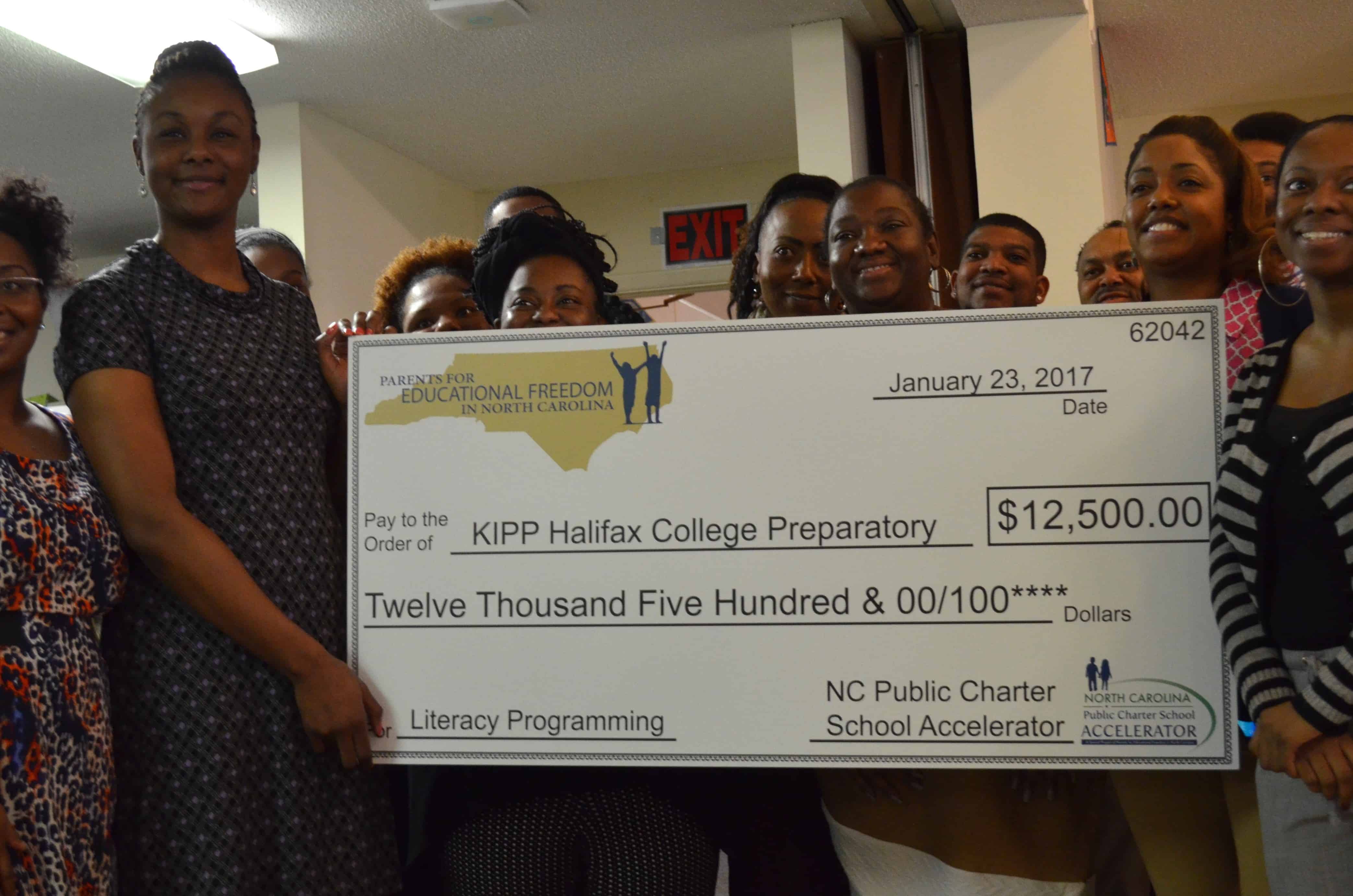

After Allison spoke, I sat down with Principal Wilkins. She said the money from PEFNC will help the school to buy more books.
KIPP Halifax has a program where they encourage children to read a million words. Those who do are called millionaires and have the opportunity to go out to a restaurant with Wilkins as a reward.
“A lot of our kids come from underprivileged communities and don’t ever even eat in a restaurant,” she said.
Right now, the school has about 1,200 books and 10 millionaires, but those are numbers Wilkins wants to increase. She thinks the money from PEFNC will allow the school to buy anywhere from 1,700 to 2,000 more books.
I asked her about the school’s approach to teaching its students.
She said staff educate their students by being “very, very laser focused on what students know and don’t know,” and they are “very intelligent and deliberate about filling those gaps.”
Staff spend about two to three hours a week outside of the classroom planning their classroom instructional time, she said. Their lesson plans are vetted by the principal and then the teachers edit them before actually implementing them in class.
The school’s student population faces challenges that make learning harder. Wilkins said that about 89 percent of the school’s students qualify for free-and-reduced price lunch. The school wrote and received a grant that allows the staff to provide free meals — breakfast, lunch, and snacks — to the students.
The school has 245 students. Of those, Wilkins said about 17 are white, four are Hispanic, two are Asian, and the rest are African American.
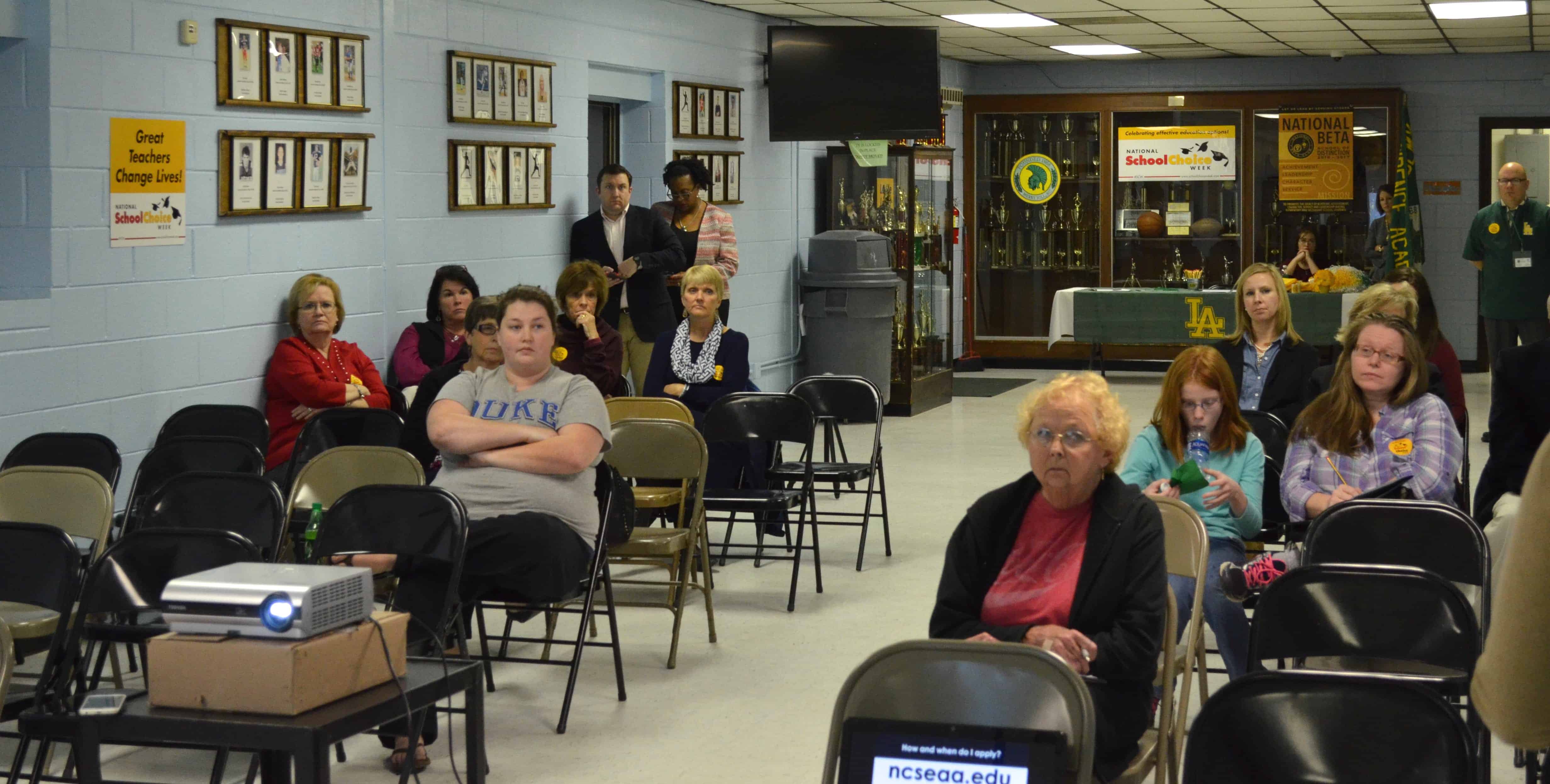

Our final stop before heading home was Lawrence Academy in Bertie County. We arrived well after the sun set. The private school was hosting a fair where other private schools were attending to show parents in the county what options their children had. The event was also an opportunity for staff of PEFNC, including Allison, to explain the opportunity scholarship program to the parents who attended.
Not everybody knows about the opportunity scholarship program, and those who do are often fuzzy on the details. Allison explained that there are actually two different opportunity scholarship programs. One option is the normal opportunity scholarship program that gives up to $4,200 to a student to attend a private school, but then there is also the children with disabilities grant, or special education opportunity scholarship program, which gives up to $8,000 a year to a student to attend private school. The two aren’t mutually exclusive. A student can take advantage of both programs.
The PEFNC presentation went on to list the counties in Northeastern North Carolina staff were focused on that evening: Beaufort, Bertie, Chowan, Gates, Edgecombe, Halifax, Hertford, Martin, Northampton, Pamlico, Pasquotank, Perquimans, Pitt, Tyrrell, and Washington.
Then PEFNC got into the requirements.
Here are the requirements as listed on the website of the North Carolina State Education Assistance Authority (NCSEAA), the organization that administers the program.
To qualify for the opportunity scholarship program, a student must meet all the following requirements:
- is 5 years old on or before August 31
- lives in an eligible household
- has not graduated from high school
- is a resident of North Carolina
- has not been in college
Additionally, a student must meet at least one of the following requirements
- received an Opportunity Scholarship last year
- was a full-time student attending a NC public school or Department of Defense school in NC last spring semester
- is entering kindergarten or 1st grade
- is in foster care or was adopted within the last year
- has a parent on full-time active duty with the military
The income requirements vary depending on the number of children in the household. For example, in a household with two children, the requirement is a gross income in 2016 of $30,044 in order to receive the full $4,200. To receive 90 percent of that, the income requirement is $39,959. In a household with eight children, however, the income requirement is $76,442 for the full $4,200 and $101,668 for 90 percent of that.
PEFNC staff told the parents that they needed to apply between February and March 1st to meet the priority selection deadline. If they apply after that, they will end up on a waitlist.
The children with disabilities grant has slightly different requirements. To be eligible, a student must meet all the following requirements:
- is 5 years old on or before August 31.
- has not graduated from high school.
- is a resident of North Carolina.
- is a child with a disability who requires special education, as documented by the public school IEP (Individualized Education Program).
Additionally, a student must meet at least one of the following requirements:
- received a Disabilities Grant last year
- was a full-time student attending a NC public school last spring semester (at least 75 school days of the second semester)
- is entering kindergarten or 1st grade
There is, however, no income requirement for the disabilities grant. The application period for these scholarships starts May 1 to apply for the following school year. To apply for either of the opportunity scholarship options, you can go to ncseaa.edu. Click on K-12 grants to apply or for more information.
There were only a handful of parents in attendance at the event. But Allison was not put off by the showing. He said it’s important to reach out to even small numbers of parents, particularly in parts of the state that don’t get as much attention as others.
“This region of the state has a lot of needs, capacity being one of them,” he said. “It’s one of these things where you just have to be consistent and intentional.”
One of the parents who attended the event wasn’t a parent at all. Hilda Swain was attending on behalf of her great nieces, one of whom is four and the other nine. The nine year old has some disabilities, and Swain wants both of them to have better opportunities.
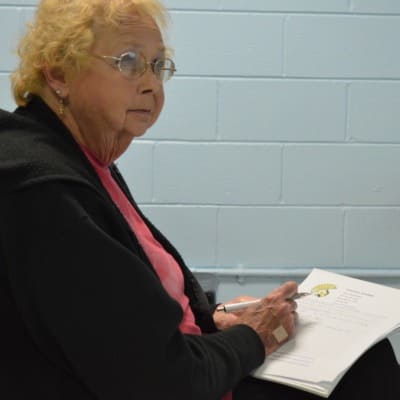

“My concern is for the one who is four now and the one who is nine with the disabilities,” she said. “If there is something better for them, that’s what I want.”
Her brother is the one taking care of Swain’s great nieces. She said the presentation at Lawrence Academy was informative, and she is going to relay the information to her brother.
“I’m going to sit down and talk about it and get him on the ball,” she said.
Sarah Curry, another attendee, has two kids in a charter school, one in kindergarten and one in first grade. The father of the younger child wants her to go to a private school, but Curry doesn’t want to break the kids up. That’s what brought Curry to Lawrence Academy last week.
She said she’s applied for the opportunity scholarship before and not received it. She will keep on applying regardless, she said.
“With this area, a lot of people want their kids in private school and not the public schools because the public schools around here are not great,” she said.
After PEFNC’s presentation at Lawrence Academy, Democratic Senator Erica Smith-Ingram said a few words to the private schools and parents in attendance. She represents many of the counties referenced at the Lawrence Academy presentation: Bertie, Chowan, Edgecombe, Hertford, Martin, Northampton, Tyrrell, Washington.
“East of I-95, we don’t always get the opportunities and the choices. And so I wanted to be sure that our residents, our taxpaying citizens, had the opportunity to access educational choice. That’s so important to me,” she said.
Smith-Ingram is a traditional public school educator who began her teaching career in Northampton County. Then she became a member of the school board and couldn’t teach in the county any more, so she has been teaching across the line in Virginia ever since.
She has four children, three of whom are living. At one time, she had two kids in private school, one in a traditional public school, and one in a charter.
She talked about all the choices available in the restaurant business, with multiple fast food restaurants operating in close proximity to each other.
“If we have those choices with food, why can’t we have those choices for our children?”
She also went on to say that children aren’t cookie cutter, and what works for one kid won’t necessarily work for another.
“If we had the choice and had the resources, we would want to provide that opportunity for our children, the greatest asset that we have, to be able to be educated and receive a quality education,” she said.
See video of her comments below.
After that, Allison, Jodice and I headed back to Raleigh to wrap up our day. At some point in our travels, I talked to Allison about his choice goals for the upcoming legislative session. One of his first thoughts wasn’t about making the opportunity scholarship less strict, but more so.
He said that currently, the law says that the highest ranking official of a private school needed a criminal background check. He doesn’t think that’s enough. He wants every single employee and member of a private school that accepts opportunity scholarships to have a criminal background check.
I asked him if he worried that would put a damper on a school’s interest in participating in the program. This is what he said:
“If you’re asking me, am I going to stand on the side of making them angry, or making sure that our children who are utilizing that program and going to that school have safety and protection, I’ll be on the side of children every time.”
Allison told me that he enrolls his children in Wake County Public Schools.
